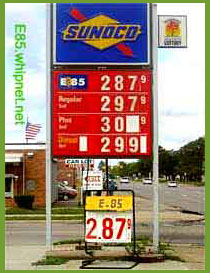Where can I buy E-85?

Meijer Inc. and General Motors Corp.
along with Gov. Jennifer Granholm, announced plans last April (2006)
to make the ethanol-gasoline blend, E-85 available at several Meijer
filling stations. Meijer is a family-owned and operated grocery and
general merchandise retailer operating more than 150 stores in Kentucky,
Illinois, Indiana, Michigan, and Ohio. There are an estimated 4 million
Flexible Fuel Cars (FFV) on the road today; flexible-fuel
vehicles are capable of burning E-85, pure gasoline or any combination of the
two. However, due to limited filling stations offering E-85, most drivers
are consigned to filling up with regular gasoline.
Michigan is one of the nation's leading
producers of corn, growing more than 257 million bushels a year yet,
according to an unnamed source; only five stations in Michigan sell
the alternative fuel. Some FFV owners may not even be aware that their
vehicle is capable of running E-85. New vehicles which are E-85 compatible,
are supposed to include a special, yellow gas cap, and a label inside
the fuel door stating the ability to utilize E-85 fuel. Anyone considering
using E-85 should be absolutely sure that their vehicle is E-85 capable
prior to putting E-85 in their fuel tank.

Advocates of E-85 tout the domestic fuel as a made-in-America alternative to imported petroleum. Burning Fossil fuels result in dirty tailpipe emissions, and can result in hazardous spills both which contribute to reducing the quality of our environment. This domestically produced fuel source helps US farmers and contributes to a lower dependence on OPEC. Ethanol is grain alcohol primarily produced from corn but, can also be produced from sugarcane, soybean and other biological resources. Additional studies are being performed to standardize the production of cellulosic
ethanol, which can be produced from many agricultural products such as corn stalks, and switchgrass. Cellulosic ethanol can also be produced from many waste items being deposited in garbage dumps across America everyday.
Currently, Michigan has one ethanol plant in Caro producing about 45 million gallons a year, but four additional plants are due within the next two years. Together, they could produce more than 200 million gallons of ethanol annually. Ethanol from corn is currently the most popular feedstock for producing E-85 but, it is not the most profitable in terms of both money and power output.
Meijer, will join forces with GM and CleanFuel USA which manufactures E-85
fueling equipment, to identify which stores will sell E-85, focusing on stores in Jackson, Lansing, Grand Rapids, Warren, Pontiac, Detroit, Rochester and Brighton. CleanFuel USA also produces E-85 pumps currently in use by Kroger
Stores in Texas.
Detroit automakers are battling to catch up with Japanese auto manufacturers in selling hybrid gas-electric vehicles. The big three are betting on ethanol to help boost their image as well as sales. GM, which already has more than 1.5 million flexible-fuel vehicles on the road, began running television and newspaper ads in 2006 touting E-85 with their "Live Green, Go Yellow" campaign. Most all new passenger vehicles sold in the United States can use either E10 or E15, a blend of 90% / 85% gasoline and 10% / 15% ethanol that is being used to replace MTBE. E-85 critics say it costs more to use as it often costs more at the pump than gasoline, and performance is slightly lower than gasoline.
|





